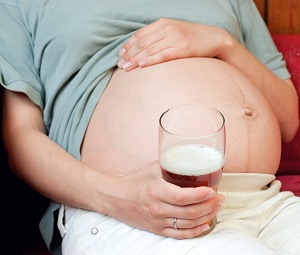Fetal Alcohol Syndrome
 Fetal alcohol syndrome is a potentially life-threatening illness caused by in utero exposure to alcohol. The type and severity of symptoms vary greatly and depend partially on the timing and frequency of exposure.
Fetal alcohol syndrome is a potentially life-threatening illness caused by in utero exposure to alcohol. The type and severity of symptoms vary greatly and depend partially on the timing and frequency of exposure.
What Causes Fetal Alcohol Syndrome?
The sole cause of fetal alcohol syndrome (FAS) is exposure by the fetus to alcohol during the mother’s pregnancy. However, the severity of the illness cannot be neatly predicted based solely on exposure. Some babies exposed to large quantities of alcohol do not develop the illness, while others develop it with only minimal exposure. This is why pregnant women are advised to completely abstain from alcohol. There is some evidence that, at certain times during a fetus’s neurological development, the fetus is more vulnerable to FAS. While there is not a strict one-to-one correlation, mothers who drink more are more likely to have babies with FAS, and large quantities of alcohol are more likely to result in more severe symptoms.
What are the Symptoms of Fetal Alcohol Syndrome?
Fetal alcohol syndrome can cause a cluster of birth defects, many of which are neurological. Symptoms vary greatly from baby to baby, but can include:
- Joint, limb, and facial deformities
- A characteristic face that includes small eyes, a very small upper lip and a short and upturned nose
- Sensory difficulties, particularly vision and hearing problems
- Intellectual delays or disabilities
- Heart problems and defects
- Mental health conditions and learning disabilities
What is the Treatment for Fetal Alcohol Syndrome?
Many of the symptoms of fetal alcohol syndrome, particularly heart problems and neurological deficits, are irreversible. Treatment focuses on managing rather than eliminating symptoms. Early intervention can help with mental health conditions, learning disabilities, and other brain-related problems that may arise from FAS. Children with malformed limbs or hearts may require early or frequent surgeries to correct the deformities. Other treatments depend on the specific symptoms of the child.
Fetal Alcohol Syndrome and the Law
Mothers who give birth to children with FAS are at risk of having their children taken away by the courts, particularly if they continue drinking. Women who drink excessively during pregnancy may have their children taken away at birth. Some advocacy groups have fought this process, arguing that women with drinking problems need treatment and support and that, with proper intervention, children can return to their biological parents. Many children in foster care have symptoms of fetal alcohol syndrome; this can sometimes interfere with their adoptability. Women of color and poor women have historically been at greater risk of having their children confiscated, raising questions about disparities in enforcement and treatment.
References:
- Adams, J. (1998, May 14). Fetal Alcohol Syndrome and the Law. Fetal alcohol syndrome and the law. Retrieved from http://academic.udayton.edu/health/01status/98adams.htm
- Harwood, R., Miller, S. A., & Vasta, R. (2008). Child psychology: Development in a changing society. Hoboken, NJ: John Wiley & Sons.
- Mayo Clinic. (2011, May 21). Fetal alcohol syndrome. Mayo Clinic. Retrieved from http://www.mayoclinic.com/health/fetal-alcohol-syndrome/DS00184/DSECTION=treatments-and-drugs
Last Updated: 08-7-2015